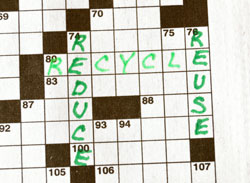Choose to Reuse

CONSIDER: Reusing is good for the environment:
CHOOSE: Reusing is a sustainable, philanthropic practice:
TEACH: Reusing is a good habit to learn:
SAVE: Reusing saves money:
The best way to reduce waste, in this order ...
Refuse [ri-fyooz], Reduce, Reuse, Compost, Recycle, Refuse [ref-yoos] 1. Refuse [ri-fyooz]: To reject or turn down (something offered or presented); to decline the offer of. Of things. trans. To reject or resist (something). (OED) 2. Reduce: To bring down or diminish to a smaller number, amount, quantity, extent, etc., or to a single thing. (OED) 3. Reuse: To use for a second or further time; to make use of again. (OED) Using a product or component of municipal solid waste in its original form more than once; e.g., refilling a glass bottle that has been returned or using a coffee can to hold nuts and bolts. (EPA) 4. Compost: The controlled biological decomposition of organic material in the presence of air to form a humus-like material. Controlled methods of composting include mechanical mixing and aerating, ventilating the materials by dropping them through a vertical series of aerated chambers, or placing the compost in piles out in the open air and mixing it or turning it periodically. (EPA) Compostable products are biodegradable, but with an added benefit: when they break down, they release valuable nutrients into the soil, aiding the growth of trees and plants. These products degrade within several months in an industrial composting facility and produce no toxic residues. (The Green Office) 5. Recycle: To make ready for reuse. (Merriam-Webster) Minimizing waste generation by recovering and reprocessing usable products that might otherwise become waste .i.e. recycling of aluminum cans, paper, and bottles, etc. (EPA) 6. Refuse [ref-yoos]: Anything that is rejected, discarded, or thrown away; rubbish, waste, residue. (OED) Also known as solid waste. Non-liquid, non-soluble materials ranging from municipal garbage to industrial wastes that contain complex and sometimes hazardous substances. Solid wastes also include sewage sludge, agricultural refuse, demolition wastes, and mining residues. Technically, solid waste also refers to liquids and gases in containers. (EPA) ...aka very last resort. (Sources: Oxford English Dictionary (OED), the Merriam-Webster Dictionary, the U.S. EPA glossary and The Green Office) |
